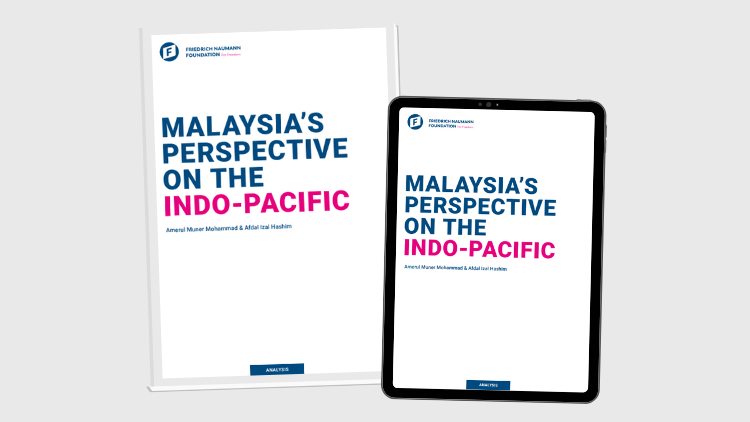Publication
MALAYSIA’S PERSPECTIVE ON THE INDO-PACIFIC

Summary of the paper:
The article "Malaysia's Perspective on the Indo-Pacific" focuses on Malaysia's role in the Indo-Pacific region and the political, economic and security challenges it faces. In addition, the article also discusses the role of other world powers and how important the EU and Germany are to Malaysia and the region as a whole.
In doing so, the authors emphasize the importance of the Indo-Pacific as one of the most important regions in the global economy and as a strategically significant region for the security and stability of the international community. In this context, the article discusses Malaysia's geostrategic interests and prospects in the region.
The article first highlights Malaysia's historical security prospects. After its independence in 1957, the Vietnam War and related insecurities in the region, and the September 11 attacks in the United States, Malaysia had to rethink its foreign policy as well as its defense strategies at the beginning of the millennium. According to the authors, the three greatest current threats to Malaysia's security are China's growing coercion, distrust of Japan's regional military ambitions, and insurgency by militant groups such as Thai Muslim separatists.
Further, they address Malaysia's transformation from a labor-intensive agricultural economy to a manufacturing and industrial nation. It requires economic and political stability to do business internationally. The authors also warn of security threats due to the use of social media.
The next section discusses Malaysia's relationship with China, which is characterized by economic cooperation but also by territorial disputes in the South China Sea. Malaysia pursues a policy of neutrality and tries to mediate between the United States and China. At the same time, the country works closely with other ASEAN members to jointly take a strong stance against China.
In the area of security policy, the article emphasizes the importance of U.S.-Malaysia cooperation in the fight against terrorism and in strengthening regional security. Malaysia is also committed to working with other countries in the region to ensure maritime security and combat the threat of piracy and other criminal activities. To be prepared in the event of an escalation and spread of the conflict in the South China Sea, Malaysia plans to further expand its naval fleet.
The article also describes the future threats and prospects facing Malaysia. If Malaysia continues to expand its naval forces in the coming years, the country could become a member of AUCUS and Quad. This, in turn, could arouse the suspicions of China, with which Malaysia maintains close relations. Good relations with Australia should be maintained in the coming years, and by expanding its naval fleet, Malaysia should foster cooperation with its neighbors. The balancing act between the U.S. and China, as well as other external great powers, is likely to become even more difficult and complex. However, a larger Malaysian naval fleet could reduce China's aggression in the South China Sea.
Furthermore, the article addresses the question of whether Malaysia needs the help of the EU and Germany. Compared to trade with China, trade with the EU as well as Germany is comparatively small. Nevertheless, Malaysia cannot disregard the EU and Germany if it wants to grow further. As for security in the region, the EU should refrain from placing warships in the South China Sea as a deterrent. This would only provoke China and not serve as a deterrent.
Finally, the article reiterates that Malaysia is aware of its role as a secure and stable region in the Indo-Pacific. Economic relations with China are good, although China presents itself as a bad neighbor. The U.S. also has no plans to reduce its presence in the South China Sea. So it remains another balancing act for Malaysia to maintain relations with both countries.
Summary by Jana Dietrich. Jana Dietrich studied in 2022 as part of a semester abroad at the Gadjah Mada University in Jogjakarta and is currently an intern in the foundation office in Jakarta.
